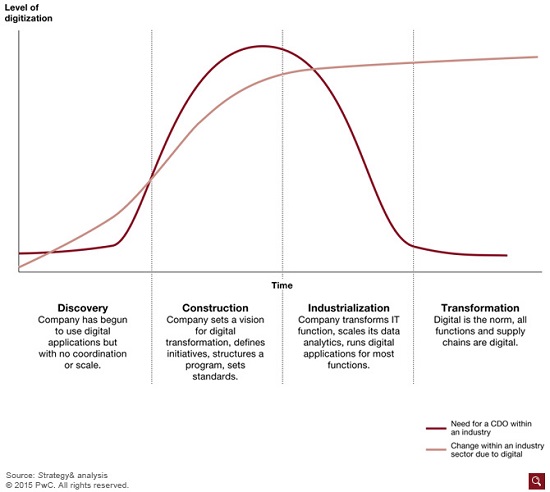A small but rapidly growing number of businesses have started hiring a CDO or chief digital officer. The main responsibility of this recent addition to the C-suite is to reshape an organization to enable it to thrive in the digital age.
The cross-functional task of the CDO encompasses the transition of operations, sales, and marketing, systems, production, technical infrastructure, the collection of data, as well as internal culture, according to a recent study by the global services company PricewaterhouseCooper (PwC).
While the number of companies that have a CDO is just six per cent worldwide, “their ranks are rapidly growing,” wrote to Dr. Roman Friedrich and Dr. Pierre Peladeau in their study Adapt, disrupt, transform, disappear: The 2015 Chief Digital Officer Study. Some 1,500 of the world’s largest firms in consumer-focused industries such as media, entertainment, food and beverage, and consumer products “are in the forefront of the trend.”
Is there a role for the CDO in government organizations?
Perhaps there is if you consider the challenges and demands faced by businesses that are hiring CDOs.
The level of connectivity “is inevitably transforming how companies reach out to consumers, as well as to their business customers, partners, and suppliers,” says Friedrich and Peladeau. “Companies in virtually every industry now understand just how much the digitization revolution is transforming the competitive landscape, and are preparing to participate in this brave new world, not just in their interactions with customers, but internally as well. Indeed, the demands of digitization will ultimately force companies to transform virtually every aspect of their business.”
RELATED CONTENT
The Capacity Squeeze: Excessive Processing or Where Has our Capacity Gone?
Do Canadian CEOs have a false sense of security?
It could be argued that “customers” of government departments are also increasingly expecting from the government, the digital conveniences they experience with consumer-focused businesses.
Although it is focused on businesses, the study by Friedrich and Peladeau may be of use to government organizations. That is because it outlines the role of the CDO as seen by companies facing various digital challenges and provides some guidance on what are the key attributes of a CDO. Such a study could help decision makers in government organizations determine if their operations will benefit from a CDO.
The doctors also include excerpts of their interview with CDOs. Almost all CDOs they interviewed emphasized that it is critical to work closely with every function of the business to “ensure their strategies and decisions are thoroughly grounded in their companies overall business strategies and goals.”
CDO may be part of management, but they must also be provided “the strategic and operational input that many CIOs have long been denied.”
“Commitment at the top management level to innovation and digitization has made my job considerably easier,” says Corinne Avelines, became CDO of decorative paints company AkzoNobel in 2014. “Senior support is key to ensuring commitment to digital at the company, especially one of this size.”
The role of the CDO is just a few years old so it is very difficult to determine whether companies with CDOs perform better that than those without CDO. However, Friedrich and Peladeau believe less advanced companies would clearly profit by hiring one top executive to develop and carry out a coherent digital strategy.
To find out more about CDOs, read the full study here.



